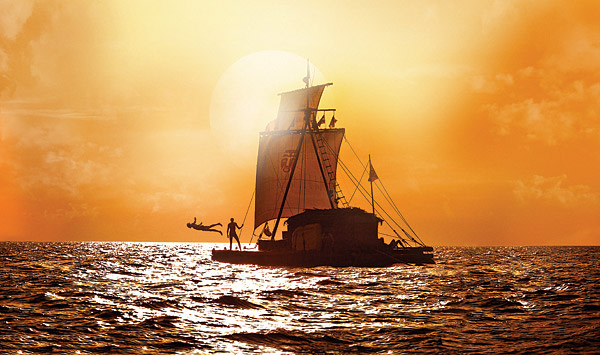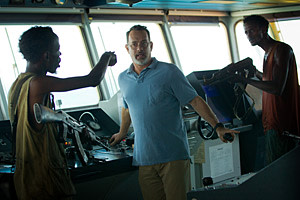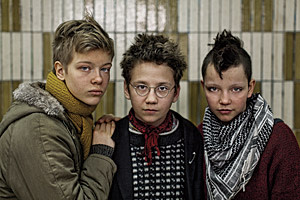London Film Festival: all at sea and beyond

Simply sign up to the Life & Arts myFT Digest -- delivered directly to your inbox.
If the Cannes Film Festival is about premieres and glamour and Venice is about (rapturously) being in Venice, then London concerns itself with one thing: watching movies. And getting the public to watch movies. An awful lot of them. Casting about for trends or themes in a festival of this size – 235 features, 134 shorts – is usually impossible but this year there is one: over the 12-day programme seven prominent films describe the extremes of human endurance. All of them bar one are based on real-life events, and the one that isn’t is a masterpiece.
Live satellite links to 30 screens across the UK and Ireland marked the opening of the festival on Wednesday with a screening of Captain Phillips, starring Tom Hanks at the helm of a high-value, 500ft US container ship held to ransom in 2009 by a handful of Somali pirates.
Paul Greengrass (United 93) presents us with a film in which many exciting and brave things happen: screeching pirates, defiant in their tiny skiff, doused by super-forceful hoses; the escaping American crew strewing broken glass on the floor of the sweating engine room of an actual working ship out in open water; Hanks transmitting coded messages to Navy Seals lounging handsomely in night vision specs – all in the head-lolling heat of the Indian Ocean.

And yet the movie is strangely uncompelling. Greengrass works hard to make the true story believable but the central character – a heedless, charming, dirt-poor Somali – has such skill with English you begin to suspect that the story has been bent in a rather boring Hollywood way.
The Epic of Everest, however, must be seen. Newly restored by the British Film Institute, it’s the official record of the legendary 1924 Everest expedition, filmed by Captain John Noel, who accompanied the doomed mountaineers George Mallory, aged 37, and Andrew Irvine, 22, on the trip. A title card invites us to join these “explorers in a far-off land and their endeavours to reach the top of the world”.
It feels unutterably lonely. The freakish, almost alien, textures of the snow and layered ancient ice. Mallory and Irvine standing in modest tweeds among gigantic yaks, smiling the polite smile of infinitely diligent men. How silly and vulnerable human tents look, how amusing the moment a climber breaks off a stalactite and waves it about like a lightsaber, how appalling when three Sherpas appear in the distance to lay six blankets in a black cross on the snow to let those waiting anxiously below know that it is all, all over.
Stunning to see, as are many of the effects in Kon-Tiki – about the 1947 Norwegian expedition via raft from South America 5,000 miles across the Pacific to Polynesia – retold by Norwegians Joachim Roenning and Espen Sandberg. The blond, dashing but emaciated ethnographer and adventurer Thor Heyerdahl (Pål Sverre Valheim Hagen) and his crew haul fat sharks by hand from the sea and surf the balsa-wood craft over gigantic rollers to avoid the razor-sharp reef around the Tuamotu Islands.
But no effects can stun like those in Gravity, in which two astronauts (George Clooney and Sandra Bullock) manage a crisis outside their ship in the middle of space. Whole sequences seem to have quite literally thousands of elements that are subject to strange and different forces. Director Alfonso Cuarón gives us appalling collisions, the earth spinning at a different pace, the work gone into it all …and yet, the script suffers a tremendous failure of nerve, involving a soapy backstory that sullies the purity of the best endurance films, those that seem to say: “How on earth do we get out of this? Just watch.”

All is Lost – modestly embedded in the middle of the festival – is everything Gravity ought to have been. Continually blockbusterishly slick and tense – near perfect, directed by JC Chandor (Margin Call). For 106 minutes one nameless man (Robert Redford) struggles on a sinking yacht 1,700 nautical miles from Sumatra. No conversations, no other cast members, no characterisation even, just everything reduced to pure action and movement with a commitment to specificity that makes you believe all you see is entirely credible.
Redford hauls ropes and plugs leaks. He navigates by the stars and fails to catch fish. He passes out, exhausted, after accidents or in the middle of thoughts (Redford is 77) and wakes to the dread rattle of storms. You continually applaud the film’s chief achievement: its universality. This is Everyman versus the sea in the same way as it was Everyman versus a truck in Spielberg’s Duel – but even more frightening because terrible things live in the sea, things that want to eat you whole.
But, crucially, because All Is Lostis not a documentary or “based on a true story”, or even “inspired by real events”, you feel doubly thrilled by the film’s brilliance. Something has been created here. An entirely fictional film matters more than any other. The heart assents to them utterly and sets them at the top of the hierarchy of the genre.
Perhaps only Steve McQueen’s Oscar frontrunner 12 Years a Slave (to be screened towards the end of the festival) can challenge that rule, taking the real-life testimony of a free black American forced into brutal slavery and turning the story into something that is not just appallingly exciting but never remotely casual with the truth.
Unlike Alex Gibney’s The Armstrong Lie. Gibney (who made the recent We Steal Secrets: The Story of WikiLeaks ) was a fan who hoped to make a pro-Lance Armstrong film during the 2009 Tour de France but soon found himself, almost reluctantly, crafting a film about Armstrong the doping villain. His movie does not go nearly far enough in condemning the cyclist, almost leading us to believe that Armstrong only did what everybody else was doing. This is simply not the case. All the cheaters were doping, and all the non-cheaters were not doping.
But the unforgettable image of human endurance here is not Armstrong’s body, strikingly lean of any fat or post-cancer flaws and hunched into his ceaseless bicycle through rain and sun and decades. It is the sheer superimposition of his will at press conferences or on chat shows. The merciless bending of others, the taking of things so outrageously far that he gives in only when the authorities have him up against a wall, and not a moment before. The film-maker here is reduced to a mere useful stooge, letting the camera roll, still under Armstrong’s spell. You leave reeling with the horror of that power. We can all lose ourselves, in more ways than one.
London Film Festival continues to October 20, bfi.org.uk/lff
——————————————-
Pick of the rest so far
Drinking Buddies
Set in a Chicago brewery, Olivia Wilde flirts and boozes with her co-worker Jake Johnson and acts cool with her boyfriend Ron Livingstone, who in turn is charmed by Johnson’s young squeeze. Are they all going out with the wrong people? Will any of them come clean? This is no gauche love-mess flick. Director Joe Swanberg’s mournful, witty little film contrives real effects out of the wrong things said and endless misunderstandings. Wilde has never been better, turning on sexiness with a siren’s precision, but also wan and lost.
Antonia Quirke
…

We Are the Best!
Johnny Rotten butter ads be damned, the spirit of punk is alive and well in this restlessly energetic joyride. It is the early 1980s. Two defiantly unmusical 12-year-old Swedish schoolgirls recruit a Christian classical guitarist (“We have to save her from God”) and take on the oppressive supremacy of parents, PE and local metallers Iron Fist with anthems such as “Hate the Sport”. Director Lukas Moodysson, who marshalled kids to similarly good effect in Together, manages to balance rebellious verve with heartwarming innocence, keeping the cuteness in check. The new-wave spirit – no froth, no filler, little learning – ought to please punks of all vintages.
Raphael Abraham
…
Kill Your Darlings
A sort of Dead Poets Society, starring Daniel Radcliffe as a virginal Allen Ginsberg, in which the young Beats at Columbia take uppers and talk dementedly. More mesmerised by Radcliffe’s hairy neck (you could file your nails on it) than the (true) story of a friend who commits a murder and expects Ginsberg to help him out of it, John Krokidas’s film (he co-scripted with Austin Bunn) has a forced feeling, with swear words sprinkled like manure to lend a pungency that none of the supposedly expostulating, dyspeptic actors can manage. Worth sticking around for the little-seen stills of the real guys in the end credits. Ah, Kerouac!
Antonia Quirke
…
The Congress
Sunset Boulevard meets Manga and The Matrix in Ari Folman’s high-concept follow-up to the lauded Waltz with Bashir. The Congress is a bizarrely meandering opus that begins with a live-action Robin Wright playing herself as an actress past her Hollywood best-before date who is offered a Faustian deal that will see her digitised and commoditised for future studio use. Having set up this worryingly plausible satirical premise, the film diverts into a psychedelic animated odyssey that is trippy in every sense – visually arresting at first but overlong and eventually wearing thin.
Raphael Abraham
…
Computer Chess
A genuinely original oddity set in the days before the geek inherited the earth and dressing like a doofus became cool. In early 1980s Texas, nerds in chequered shirts and Magoo glasses schlep massive monoliths of circuitry and plastic to a dowdy Texas hotel, where their hardware battles wits on the chessboard. Can it even overcome a human? Writer/director Andrew Bujalski isn’t overly concerned with plot but with conspiracy theorists sharing the hotel space, the atmosphere grows oppressively strange. Shot (fittingly) in black and white, lo-fi aesthetics and a mockumentary mode give the film an uncanny period authenticity. It lacks a decisive denouement, but then endgames are tricky, as any chess nut knows.
Raphael Abraham
Comments